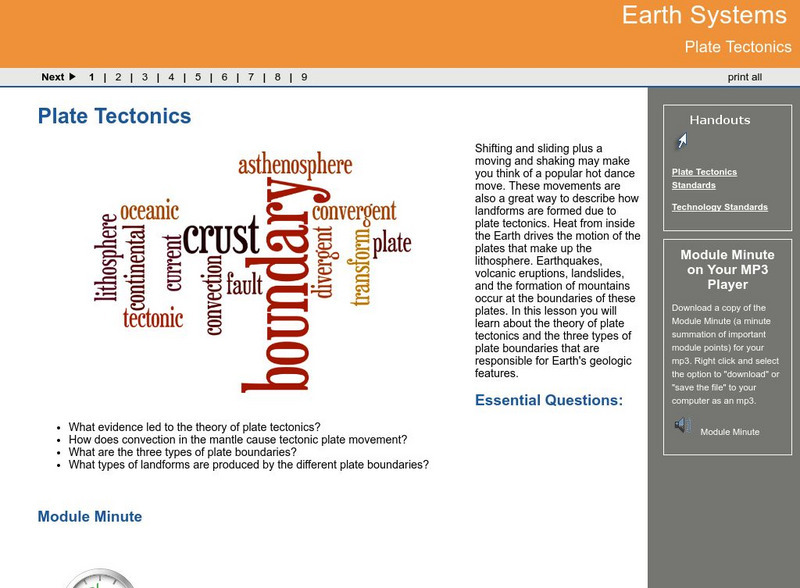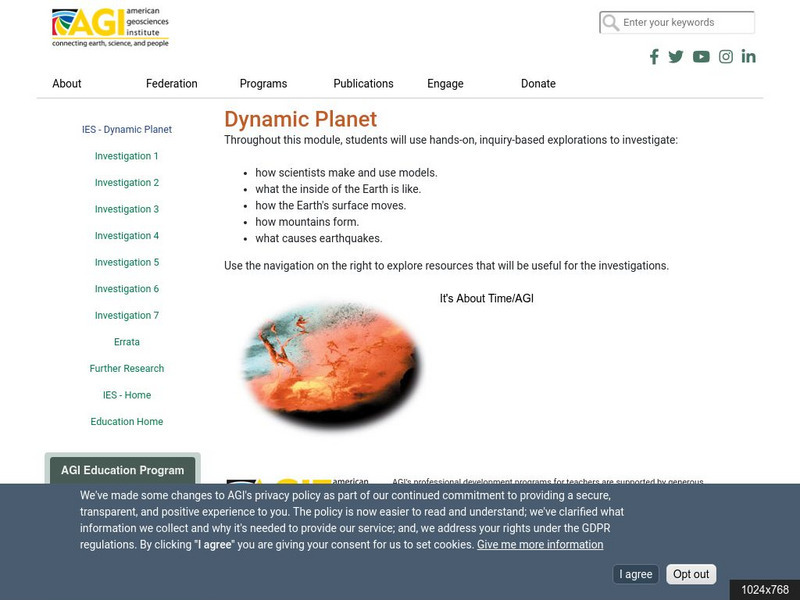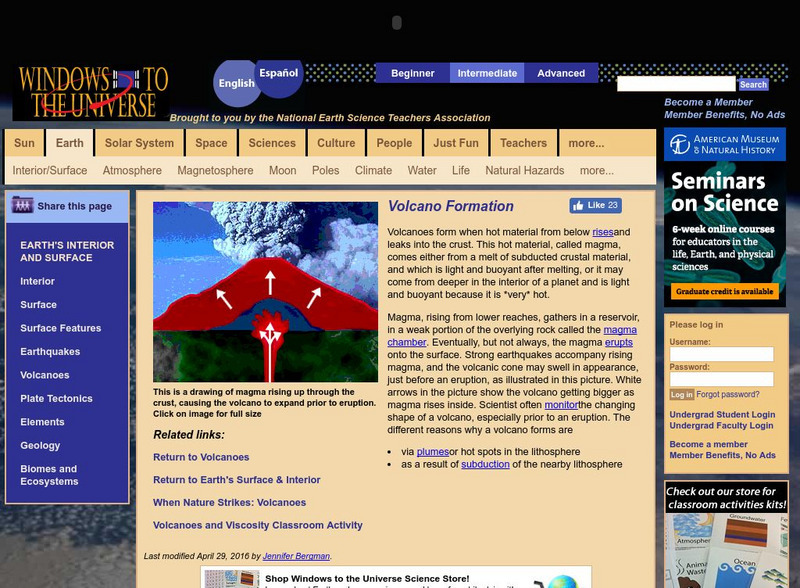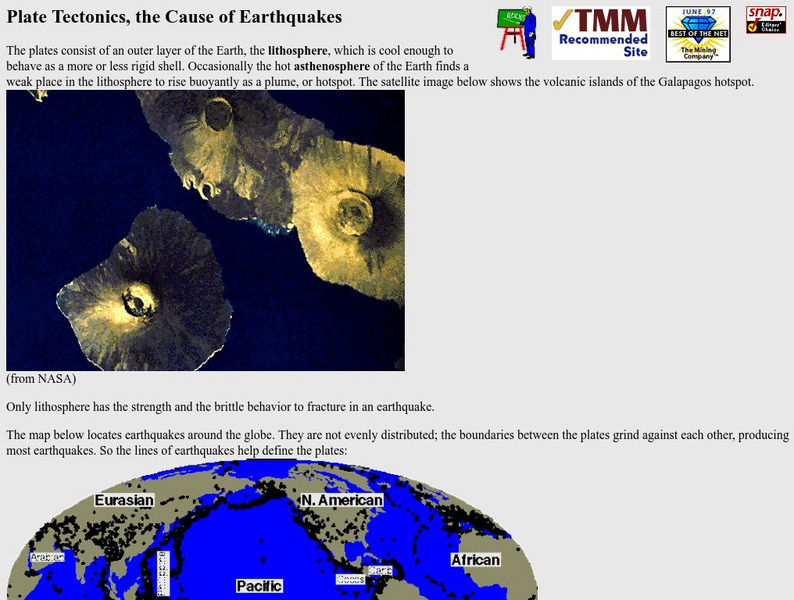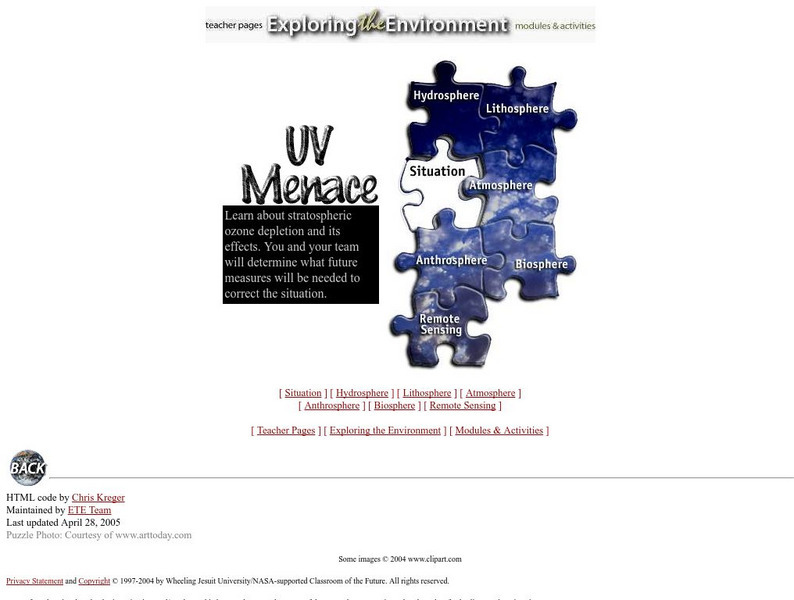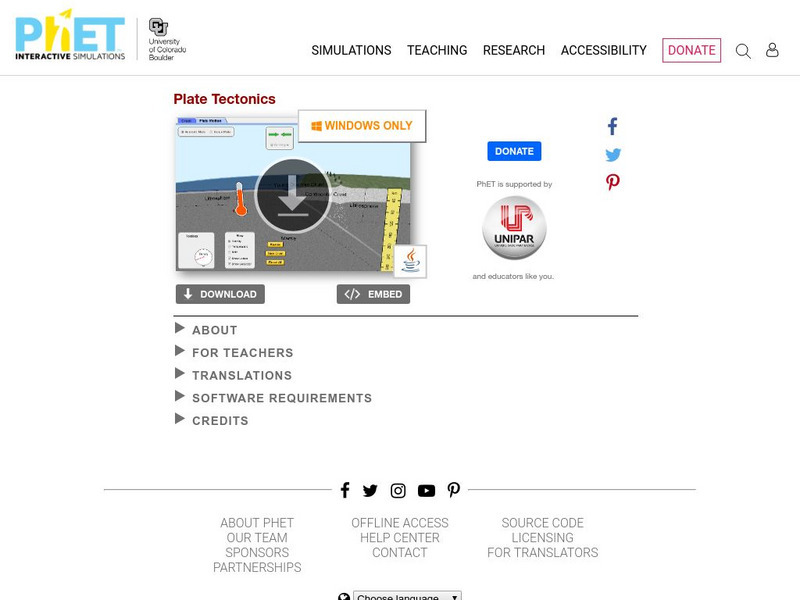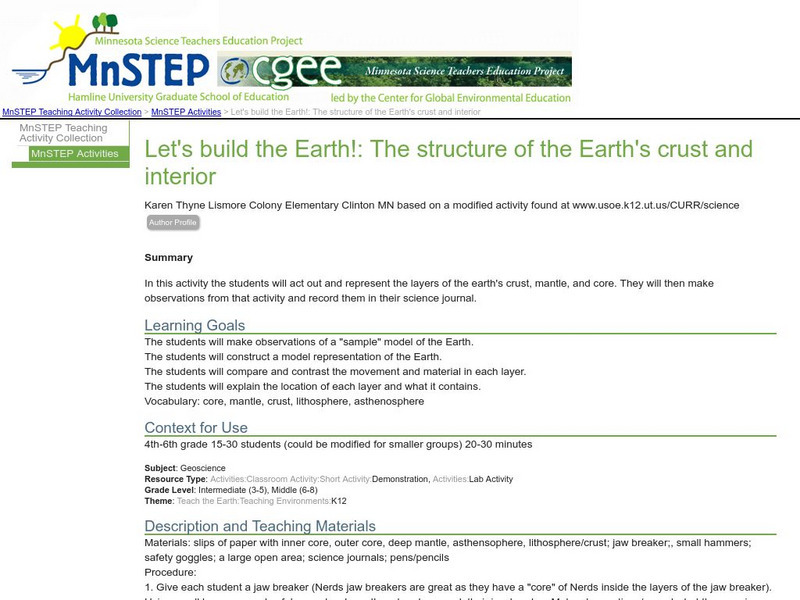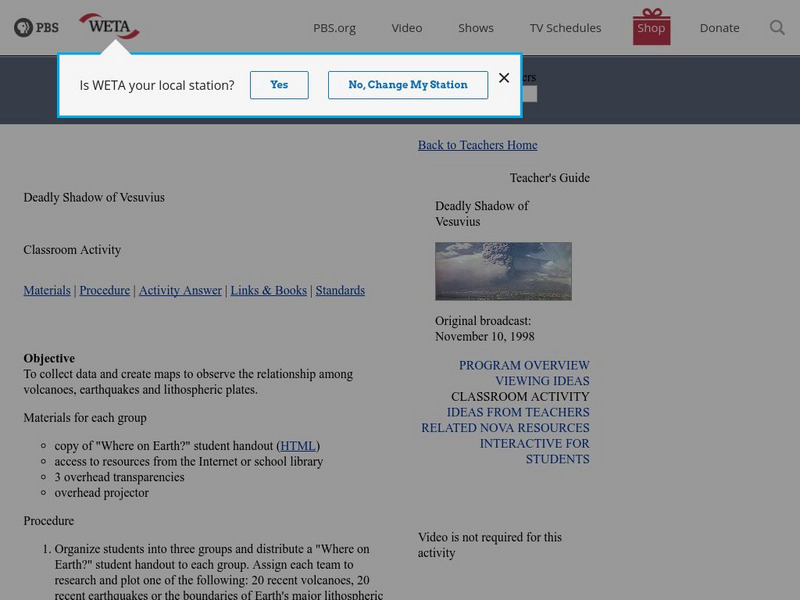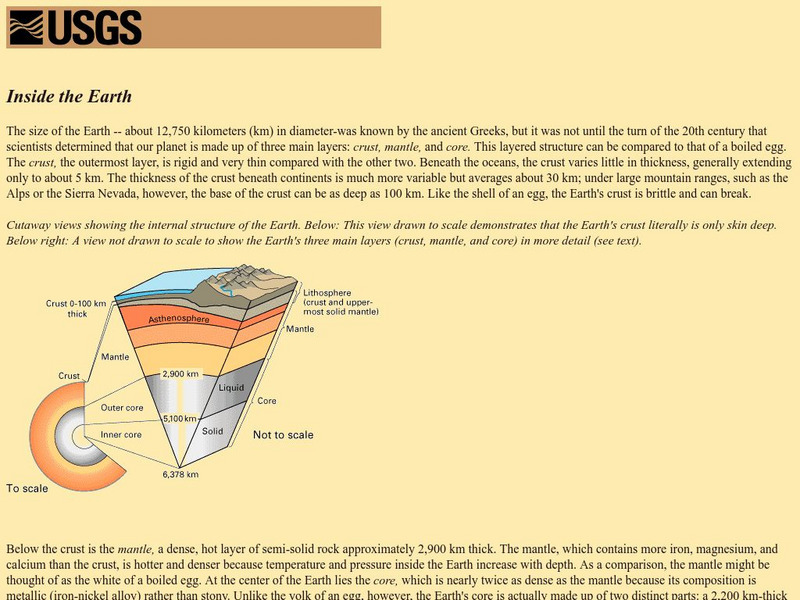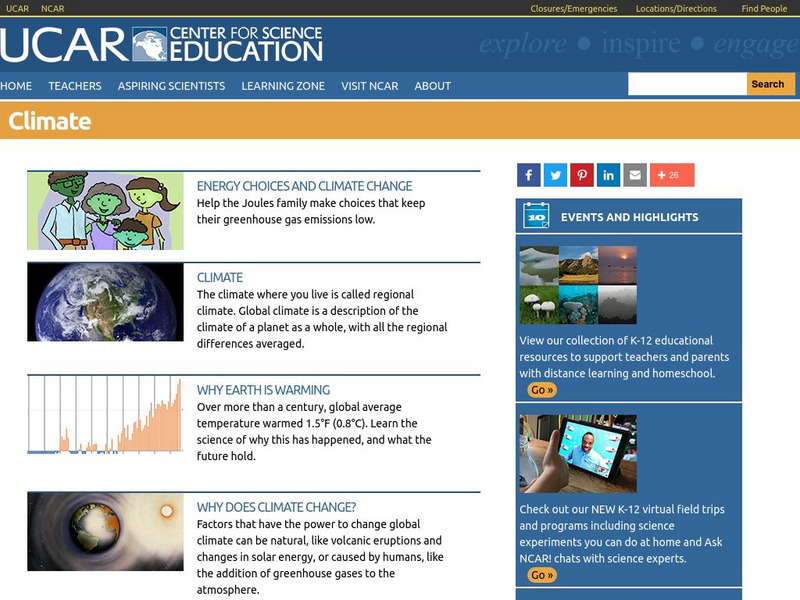Other
Interactions Between the Atmosphere & Hydrosphere [Pdf]
A discussion of the interactions between the four spheres of Earth and how they affect weather and climate. The slideshow is divided into two parts. The first deals with interactions between the atmosphere and the hydrosphere and the...
Georgia Department of Education
Ga Virtual Learning: Plate Tectonics
In this interactive lesson you will learn about the theory of plate tectonics and the three types of plate boundaries that are responsible for Earth's geologic features.
American Geosciences Institute
American Geosciences Institute: Dynamic Planet
Seven hands-on lessons module where students learn about our dynamic planet. These inquiry-based explorations investigate scientific models, earthquakes and seismic waves, Earth's interior, Earth movements, the lithosphere, plate...
TeachEngineering
Teach Engineering: How Mountains Are Formed
Middle schoolers investigate how mountains are formed. Concepts include the composition and structure of the Earth's tectonic plates and tectonic plate boundaries, with an emphasis on plate convergence as it relates to mountain...
Oregon State University
Osu: Volcano World: Layers of the Earth
This is a website not only on the mantle but also about all the layers of the earth.
National Earth Science Teachers Association
Windows to the Universe: Volcano Formation
Explanation of the factors that result in the formation of volcanoes, some basic but helpful animations and photographs.
University of Colorado
University of Colorado: Ph Et Interactive Simulations: Plate Tectonics
Explore how plates move on the surface of the earth. Change temperature, composition, and thickness of plates. Discover how to create new mountains, volcanoes, or oceans! Java is required.
National Geographic
National Geographic: Encyclopedia: Mantle
An in-depth look at the structure and composition of Earth's mantle, with lots of visuals. Covers lithosphere, Mohorovicic discontinuity, asthenosphere, transition zone, lower mantle, the d double-prime region, mantle convection, mantle...
Other
University of Texas Arlington: Isostasy, Gravity, Magnetism, and Internal Heat
An in-depth look at how isostasy works and the processes taking place during glaciation and the melting of glaciers. Looks at gravity and the effects of density differences within the crust and mantle, and at Earth's magnetic field and...
TED Talks
Ted: Ted Ed: A Guide to the Energy of the Earth
Energy is neither created nor destroyed - and yet the global demand for it continues to increase. But where does energy come from, and where does it go? This video examines the many ways in which energy cycles through our planet, from...
Other
Nevada Seismological Laboratory: Plate Tectonics, the Cause of Earthquakes
This site contains an in-depth explanation of the causes of earthquakes as they relate to plate tectonics, and also has many nice and easy to read pictures, maps, and diagrams of plate tectonics and earthquakes.
Center for Educational Technologies
Nasa Classroom of the Future: Environment Module: Uv Menace
This site provides information and activities for classes to learn more about ozone depletion and UV radiation.
Other
Bscs: Content Background Earth's Changing Surface
This is written to support and further your content learning about the dynamic nature of Earth's surface. The goal is for you to develop a conceptual understanding of landforms so that you will be able to more effectively teach...
E-learning for Kids
E Learning for Kids: Science: Greece: What Is the Earth Made Of?
Dionysus is a Greek God. and a theater director. Help him get ready for the play and learn about land, water, and air. After completing this lesson, students should be able to identify the different materials Earth is made up from (land,...
University of Colorado
University of Colorado: Ph Et Interactive Simulations: Ph Et: Interactive Simulations: Plate Tectonics
Students studying plate tectonics will better understand its concepts with this virtual experiment that tests how plates move on the surface of the earth. Temperature, composition, and thickness of plates can be changed to create new...
Science Education Resource Center at Carleton College
Serc: Let's Build the Earth!: The Structure of the Earth's Crust and Interior
In this activity, learners will make observations then construct a "sample" model representation of the Earth's layers. They will compare and contrast the movement and material in each layer explaining the location and what it contains.
National Institute of Educational Technologies and Teacher Training (Spain)
Ministerio De Educacion: Los Cambios en El Medio Natural I
In this unit you can learn about the internal structure of the Earth. It has 13 interactive activities.
National Institute of Educational Technologies and Teacher Training (Spain)
Ministerio De Educacion: Los Cambios en El Medio Natural Ii
In this unit you can learn about the deformation of rocks, magmatism, plutonism and seismic waves. It has 16 interactive activities.
PBS
Pbs Teachers: Deadly Shadow of Vesuvius
Observe the relationship among volcanoes, earthquakes and lithospheric plates by collecting data and creating maps. This activity was created to be used with the NOVA program, "Deadly Shadow of Vesuvius" but the video is not necessary...
Other
Plate Tectonic Theory [Pdf]
Check out this slideshow on Plate Tectonics-The unifying theory for all other theories in the Earth sciences-Has resulted in a more detailed understanding of Earth history-Has enabled geologists to more precisely(and cheaply) discover...
US Geological Survey
Usgs: Inside the Earth
This is a website to learn not only about the inner and outer core, but also about the crust and the mantle of the interior of the earth.
Center for Educational Technologies
Exploring the Environment: Earth System Science
Explains what the four spheres of the Earth are, and the interactions between them.
Scholastic
Scholastic: Study Jams! Science: Lithosphere, Hydrosphere, and Atmosphere
A slideshow and a short multiple-choice quiz on the rock surface of the Earth, its water, and the gas layers that surround it.
University Corporation for Atmospheric Research
Ucar: Introduction to Climate
A detailed overview of the Earth's climate, with explanations about the difference between weather and climate, dendrochronology, palynology, and how Earth's climate has changed over time. All information is reinforced through pictures,...


![Interactions Between the Atmosphere & Hydrosphere [Pdf] PPT Interactions Between the Atmosphere & Hydrosphere [Pdf] PPT](https://d15y2dacu3jp90.cloudfront.net/images/attachment_defaults/resource/large/FPO-knovation.png)
